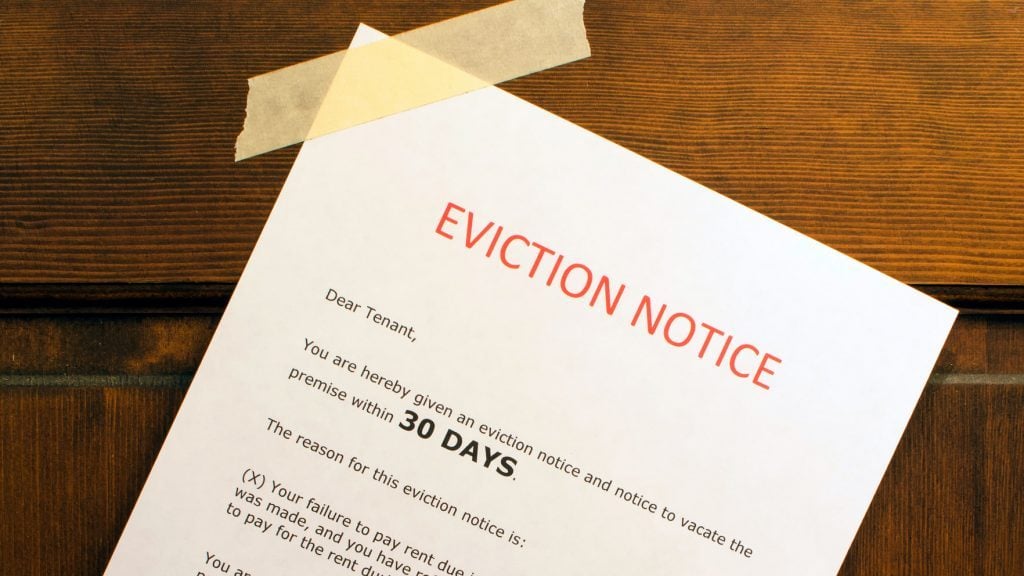Housing industry groups have united in their opposition to the Centers for Disease Control and Prevention’s decision to extend a nationwide moratorium on evictions until July 31.

The one-month extension of the CDC’s ban on evictions might be welcome news for struggling tenants, but critics say it’s also hurting housing providers. Many say they have not received rental payments from tenants in over a year. As a result, they’re forced to absorb billions of dollars in losses each month due to not getting paid rent on their properties.
The National Association of Realtors is part of a broad coalition of industry groups opposed to the ongoing eviction ban. In a statement, NAR President Charlie Oppler said the extension of the moratorium continues a broad and overreaching policy that hasn’t been needed on a national level for quite some time already.
“The real estate industry expressed our united opposition to a moratorium extension, which harms small housing providers and threatens stability in the market,” Oppler added. “We will continue to push for reforms to improve deployment of rental assistance, which remains the best solution for all parties.”
In recent months the NAR has pushed hard for rental assistance from the government to help struggling landlords. A total of $46.55 billion has since been allocated to states in President Biden’s latest COVID-19 rescue package, but the distribution of that money has been slow. The NAR says that with states still scrambling to disburse the funds, housing providers are struggling to cope with their ongoing losses.
Other groups had lobbied hard for an end to the moratorium, warning that just one more extension would likely put hundreds of landlords out of business.
National Apartment Association Chief Executive Bob Pinnegar told CNBC that with each passing month, the risk of losing an increasing amount of rental housing grows.
“It’s ultimately jeopardizing the availability of safe, sustainable and affordable housing for all Americans,” Pinnegar said. “Flawed eviction moratoriums leave renters with insurmountable debt and housing providers holding the bag as our nation’s housing affordability crisis spirals into a housing affordability disaster.”
Most housing providers in the U.S. are actually individual investors rather than large corporation. Individuals are said to own around 23 million units in 17 million properties across the nation, according to Census Bureau data. CNBC said more than six million renter households are currently behind on their rent, and that the smaller landlords have next to no recourse available.
CNBC spoke to Howard Simon, who rents out three units within a small building Massachusetts. He complained he hasn’t received any rent on one of those units since October, and that the tenant now owes close to $7,000.
“I have mortgages, I have expenses for repairs to that particular building, and I’m losing one-third of the rent because of this,” Simon said. “And you know the other tenants who are occupying the other two units, they’re trying their hardest and doing their best.”
Simon said that he had tried to contact the tenant that has fallen behind on their rent but to no avail. The tenant has not responded, and worse, hasn’t even bothered to apply for the rental assistance they’re entitled to. CNBC said one of the main reasons for rental assistance distribution being so slow is that tenants and landlord must both be involved in the process. If a tenant simply refuses to cooperate, as in Simon’s case, the money is not paid out.
“In my particular instance the tenant is not cooperating with even completing the application,” Simon complained. “I’m just a small landlord, I’m not a big corporation like many large rental organizations, so although the funding is very helpful, if the tenant doesn’t cooperate then everything falls apart.”
Landlord groups have also criticized the way rental assistance is being distributed. Dean Hunter, CEO of the Small Multifamily Owners Association and a landlord himself, singled out local governments for creating a rental assistance bureaucracy akin to “Dr. Frankenstein”.
“They’ve required the states and cities to create entire new infrastructures to get money out, instead of just using the existing community-based organizations and safety nets,” he told CNBC.
The Biden administration has held out hope to landlords, saying the latest eviction moratorium extension is for “one final month”. It has also promised further action that it says will prevent a potential wave of evictions and foreclosures. For instance, it has asked state and local courts to adopt anti-eviction diversion programs to help tenants with missed payments remain in their homes. It also promised to speed up the distribution of rental assistance and increase awareness about its availability.
Whether that happens remains to be seen, but Hunter warned of significant ramifications for the housing industry if landlords don’t get help soon.
“There is going to be a loss of naturally occurring, affordable housing,” Hunter said. “Because small landlords are just going to sell their properties.”